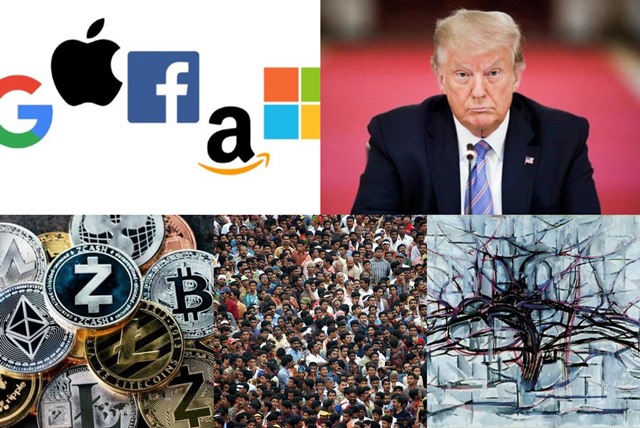Is Big Tech melting down or is it just an opportunity to downsize?
Big Tech made the headlines last week but not for the usual reasons. No, tech giants such as Twitter, Meta (which owns Facebook), Snap, Amazon, and Microsoft, weren’t on a buying spree. Nor were they announcing sensational new breakthroughs in high technology. Instead, they were sacking employees in heaps. It all started after Elon Musk’s rather noisy takeover of Twitter, the social media platform.
Almost immediately after Musk paid some US$44 billion for Twitter and accompanied it with some juvenile antics (he carried a bathroom sink to the company’s headquarters ostensibly to drive home the message: “Let it sink in”) and publicised his dismissal of the company’s four top honchos, Musk sacked half of the 7500 employees that Twitter had worldwide. Then, in a company-wide email, titled A Fork In the Road, he announced that to survive, Twitter employees had to be “hard-core” and keep intensely long hours. Many employees decided to quit, raising apprehensions about Twitter losing the expertise and skills essential to its functioning.
While Musk was creating drama at Twitter (the sackings plus his own histrionics tweeted on the platform itself), elsewhere in the realm of Big Tech, at Meta, which owns Facebook, Chairman and CEO Mark Zuckerberg decided to sack 11,000 (or 13%) of Facebook’s employees. The reason cited was operating losses owing to the collapse of its advertising revenues. Both Twitter and Facebook are platforms that depend on advertising for revenues and both have been hit hard by the slowdown, inflation, and depressed consumer demand.
Wait, what? Aren’t those typically travails of brick-and-mortar players, which get hit when inflation rises, demand declines, and the economy turns sluggish. Weren’t digital companies supposed to be resilient and not be affected by that stuff. As it happens, no. Across BIt Tech, companies have been hit hard by economic downtrends.
At Twitter, the sackings may have been motivated by a new owner (one who might well have overpaid for his acquisitions) and his hurry to shore up the bottom line at the company, but at Meta, it was the sort of thing that afflicts old economy companies. Zuckerberg’s company had overinvested in Facebook before the pandemic and the growth that it had expected simply did not materialise. Also, Meta has invested US$36 billion in Metaverse, a networked virtual world where people can live, work, shop, and interact with others, all from the comfort of their homes. Although it sounds awfully like a celebration of sedentary lifestyles, Meta has hugely ambitious plans for it. All of this, however, has meant that Meta’s financial performance has been under pressure. Hence the layoffs.
There is an old economy thing but it seems to hold good for players in the new digital economy equally. When top players in an industry are seen taking measures to cut costs by, for example, downsizing their workforce, often it becomes a cue for others in the same sector to follow suit. It may seem like lemming-like behaviour but it is actually an opportunistic phase when other players can also take the opportunity of cutting costs even if it is not a critical need yet.
The downsizing we are seeing at Big Tech (besides Twitter and Meta, Amazon and Microsoft have also begun firing large numbers of employees) may be caused by the global recession and sluggish consumer demand but part of it is likely the outcome of companies deciding to use the travails of Twitter and Facebook to do their own downsizing at a convenient juncture when the chances of eyebrows being raised could be low.
Donald Trump hopes to bounce back
In the US, the number of former Presidents who contest presidential elections after being defeated in one is small–four to be precise. Now, Donald Trump is set to add to that list. Last week, Trump announced that he was throwing his hat in the ring in the 2024 elections. Trump lost the last election to Joe Biden by a margin of seven million votes but he has till recently held that the elections were not fair and that victory was “stolen” from him.
Now, as he kicks off his campaign, he has stopped talking about the unfairness of the elections but has vowed that he wants to make America “great and glorious” again. Trump’s announcement comes after the Republicans failed to register a convincing victory in the
midterm elections recently. The Democrats managed to control a majority in the Senate, while the Republicans have a slender majority in the House.
Still, Trump appears to be the frontrunner among Republican nominees. In the recent past, Trump has outpolled most of his rivals in the party for the primaries. But that might be changing. Among Republican primary voters, support for Trump’s bid for the presidential polls has fallen by 9% in the past three months and at least one poll has found that Florida governor Ron DeSantis’ popularity has grown.
It is early days though, and the sentiment can change in the coming months. In his speech announcing his candidacy, Trump reiterated his earlier policy of clamping down on immigration, lowering taxes and free trade deals to lift the economy, and of election reforms that include reverting to paper ballots from voting machines. In the coming months, he will likely amp up the rhetoric. How Americans will respond will be interesting to watch.
A most cruel blow to cryptocurrencies
November 2022 will go down as a nightmarish month for investors in cryptocurrencies. It was when FTX, a multi-billion dollar cryptocurrency exchange founded and run by an erstwhile poster boy of the crypto world, Sam Bankman-Fried, collapsed.
FTX was founded in 2019 and, at its peak in 2021, had over one million users and was the third-largest crypto exchange by volume. In a short period of time, FTX and Bankman-Fried built up a credible reputation and commanded respect. But things began to turn when the founder used funds from the exchange to trade via his own crypto trading company.
Once investors got a whiff of what was happening, a run on the FTX exchange began, it got bankrupted, and overnight, Bankman-Fried turned from hero to villain.
The bigger implication of this is that for the cryptocurrency scene, which is often misunderstood, FTX’s collapse could be a body blow.
Cryptocurrency is a digital currency in which transactions are verified and records maintained by a decentralised system using cryptography, rather than by a centralised authority. Trust and counter-checks are at the heart of the system if it has to work. A fraud, of the sort that FTX and its founder were involved in, can become a setback from which the crypto market could find it difficult to rebound.
India’s population bomb
The estimated population of India is at present 1.39 billion–Europe has less than 750 million; USA 330 million; and UK 68 million. While China is still the most populous country with 1.41 billion, India is expected to beat China in 2023 and by 2060, India’s population is forecast to soar to 1.65 billion.
But, like everything else in India, there is a great divide built into the demography of the country. As with development, societal norms, gender equality, and income inequality, which vary between regions of a vast country with wide diversity, India’s population is not growing homogeneously. In the northern states, particularly Uttar Pradesh and Bihar, the population is growing at a rate much higher than in the southern states.
While many of the factors that determine the rate of growth of the population depend on literacy, economic progress, and income, what this disparity has meant is that in parts of India the population growth is akin to a baby boom and the average age in those regions is low. But in areas (for instance, in the south) where population growth is slower or even stagnant, the problem could be different–that of an aging population.
For India’s policymakers who already face tasks of diverse complexity because of the vastly different parts of the country, this could pose yet another tough challenge.
Upside downs of abstract art
Piet Mondrian was a Dutch master who was one of the pioneers of 20th-century abstract art. Mondrian died in 1944 at the age of 71 but many of his paintings are prized possessions of galleries and collectors around the world.
Recently it emerged that a painting by Mondrian may have been hanging upside down for 77 years at various galleries that it has been exhibited in. The painting, New York City 1, is rendered in Mondrian’s characteristic style of geometric vertical and horizontal lines and a German curator only recently realised that it might have been hanging upside down.
Incidentally, it will continue to hang upside down because the 80-year-old work of art is fragile and may be damaged if it is put the right way up.
Read More: http://13.232.95.176/





